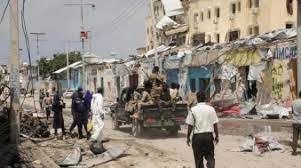The Somali government has announced that it will take action to protect the country’s people from the threat of terrorism, according to a new report by the UN Security Council.
The large port city is the latest to be hit by a spate of violent actions by the Shebab in recent months, which have included bloodshed in the capital Mogadishu and central Somalia.
The attack, which began at around 12:45 local time (09:45 GMT), ended at around 19:00 after three attackers inside the hotel were shot dead by Jubaland state security forces.
Jubaland’s security minister, Yusuf Hussein Osman, said nine people were killed and 47 injured, “including students who were leaving a nearby school at the time of the attack”.
“The security forces ended the siege in good time,” he said.
The attack was carried out by four men: one who carried out a suicide attack, followed by the intrusion of three armed men into the hotel.
According to Yusuf Hussein Osman, the attack began with a suicide bomber “who blew himself up”.
Witnesses told AFP it was a car bomb. “A suicide bomber drove a vehicle to the entrance of the hotel before gunmen entered the building. Shooting started inside,” said one of them, named Farhan Hassan.
The Shebab claimed responsibility for the attack, saying they were targeting a hotel where members of the Jubaland administration were gathered. They had carried out a similar attack on local authorities at a hotel in the city in July 2019, killing at least 26 people and injuring 56.
The Islamist group, linked to al-Qaeda, has been fighting the internationally-backed federal government since 2007. It has been driven out of major cities – including the capital Mogadishu in 2011 – but remains firmly entrenched in largely rural areas, particularly in the south of the country.
Kismayo, the capital of Jubaland, 500 kilometres south of Mogadishu, was a stronghold of the Shebab, who earned a healthy income from its port activity before the city was taken over in 2012 by local militias backed by Kenyan forces.
– “All-out war” –
In recent months, the Shebab have stepped up their activity in Somalia, a poor and unstable country in the Horn of Africa, including a spectacular 30-hour assault on a hotel in the capital Mogadishu in late August.
After the attack, which left at least 21 people dead and 117 wounded, President Hassan Sheikh Mohamoud promised an “all-out war” to eliminate the Shebab and called on the population to “stay away” from areas controlled by the Islamists, who were to be targeted by future offensives.
The security forces and local clan militias have launched military operations in the centre of the country, which the authorities say have enabled them to take background from the Islamist fighters.
The US military is also carrying out air strikes. One of them killed Abdullahi Yare, one of the highest-ranking leaders and co-founder of the movement, in the south of the country at the beginning of October.
A few hours after the Somali government announced his death, a triple bomb attack on a government building in the central town of Beledweyne killed at least 30 people and injured 58 others.
In addition to the Shebab insurgency, Somalia is also threatened by a looming famine, caused by the worst drought in more than 40 years.
Across the country, 7.8 million people, or nearly half the population, are affected by the drought,
 موقع وجه أفريقيا موقع وجه أفريقيا هو موقع مهتم بمتابعة التطورات في القارة الأفريقية
موقع وجه أفريقيا موقع وجه أفريقيا هو موقع مهتم بمتابعة التطورات في القارة الأفريقية



